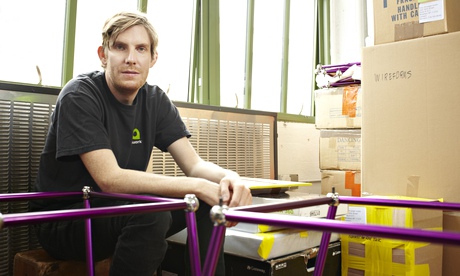
Despite dark declarations that the novel is dead, that this quintessentially modern literary form, invented (as we know it) in 18th-century Britain cannot survive the age of social media, artist Cory Arcangel's new book, Working on My Novel has just been published, contradicting those naysayers.
For it seems a lot of people out there are doing just that. Not only are they working on "my novel", but they tweet that they're "working on my novel". Arcangel's discovery of a vast online community of aspiring novelists is hugely reassuring to techno-believers who would hate to admit that some of the cultural effects of the internet and social media might be, y'know … destructive.
A bottle of red, a hot bath, and working on my novel until my man gets off work. Sounds like a fantastic start to the holiday. :)
— Cheryl CottrellSmith (@CottrellSmithC) December 23, 2012But of course Arcangel's book is not reassuring at all. This New York artist is the most interesting exponent of digitally derived art around, and that is not because he is some inane art-as-code evangelist. Working on My Novel is a deeply ambiguous document. All these people have tweeted that they're Working on My Novel – adding that they're taking a break by the pool, or too tired to write any more today, or writing while eating cereal and watching TV. How many of these novels will ever get finished?
Working on My Novel is a document of distraction, a portrait of a world that may either be humming with creativity or lost in time-wasting forms of micro-literary expression (hey commenters, I've given you a nice line there …)
Jonathan Franzen, who really does work on his novels, famously disconnects himself from the digital hum of the modern world when he writes, even going so far as to block up his internet connection so he can't be tempted to use it. He certainly does not use the hashtag "working on my novel". Now that Philip Roth has retired from writing novels, perhaps he would have time to tweet – not that he ever would – but when he was writing he clearly cut himself off from all forms of distracting blather.
working on my novel and having to add words to the dictionary such as "swagger" "bromance" and "jiggin" to describe a certain character...;]
— Keela (@Keelers63) January 15, 2013Does Working on My Novel in truth reveal the slow death of serious fiction, as literary endeavour becomes a mere social pose?
No. For Working on My Novel is, of course, itself a kind of novel – albeit one sampled from the real world, like another novel by an artist, Andy Warhol's a. Where Warhol recorded conversations and transcribed them as a: A Novel, Cory Arcangel – a big Warhol fan – has collected tweets about working on novels into a novel about working on novels.
As a funny and frustrating series of glimpses into stories we'll never hear the end of, a portrait of writers or supposed writers at work, or what Marcel Duchamp called a "delay", Working on My Novel has many great antecedents in the history of the novel.
Eminem - Survival
There's something about this song that gives me the energy boost to do my studies, working on my novel and songs
— Andrew Le (@BlackPhynix) October 20, 2013Even before the emergence of the modern novel proper, Miguel de Cervantes incorporated false starts into his prose epic Don Quixote. At one point the story is interrupted when the first part of the book is revealed to be a manuscript that Cervantes purportedly found in Toledo. In 18th-century Britain, Laurence Sterne's endlessly self-deconstructing novel Tristram Shandy was published to sensation and controversy. In Italo Calvino's funny and sad (post)modern masterpiece If on a Winter's Night a Traveller, the characters are linked by their desperation as readers to fathom a bewildering succession of books that start well but never get far before they are replaced by the next unfinished tale.
In fact, the problem of survival for the literary novel today is not how to write traditional stories. It is how to find new ways to play the games of self-consciousness that have been taken to such ingenious heights by such destroyers and creators of the novel as Cervantes, Sterne and Calvino.
In this struggle to find new ways to joke about the impossibility of fiction, Working on My Novel feels like a joyous move forward. Cory Arcangel has created something deeply liberating, at once cynical and optimistic. Once again, as always, the novel is reborn in the contemplation of its own death.

